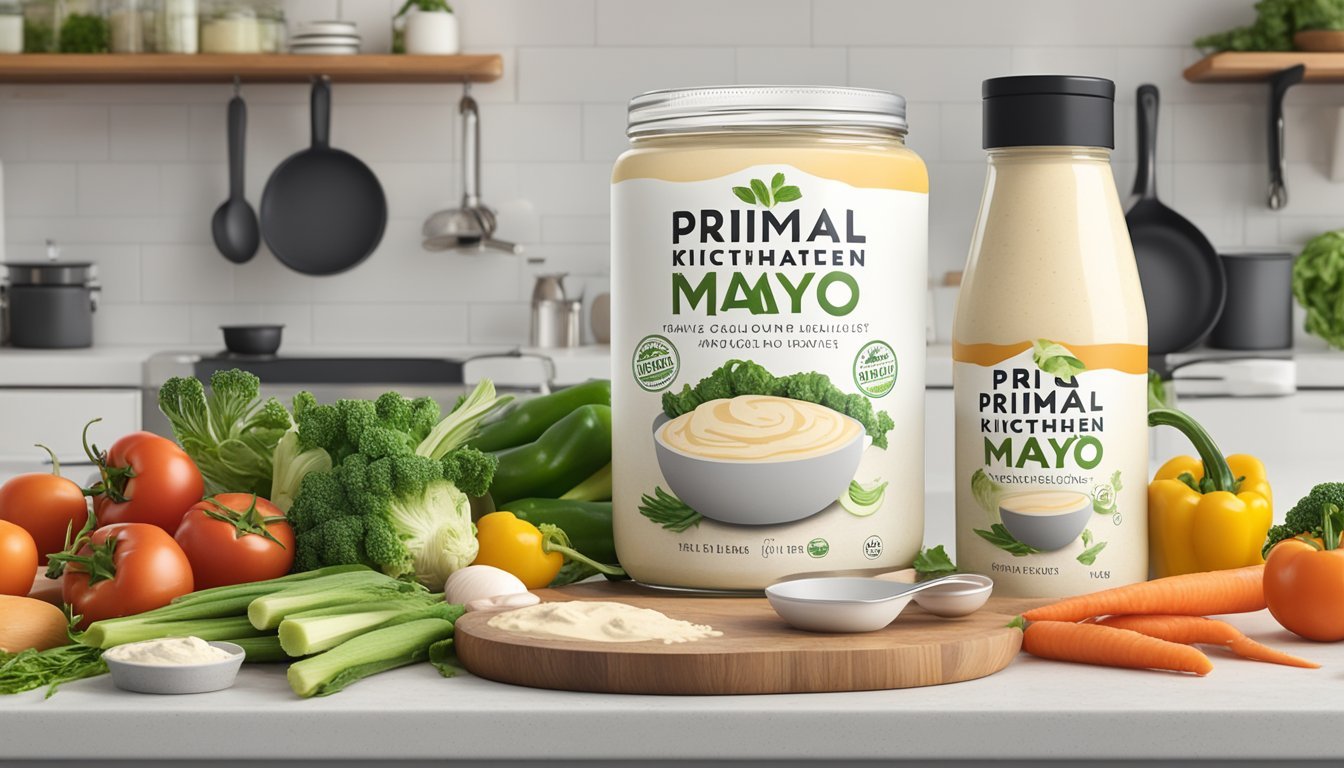How to Cook with Primal Kitchen Mayo
Mastering Paleo-Friendly Meal Prep
Cooking with mayonnaise isn't just about creating creamy sandwiches or adding a dollop to a salad. Primal Kitchen Mayo has redefined the role of mayonnaise in the kitchen, especially for individuals following a paleo diet. This condiment has become an essential component for preparing paleo-friendly meals, providing a versatile foundation for a wide array of recipes. The paleo diet emphasizes whole, unprocessed foods, and Primal Kitchen Mayo fits the bill, as it is made with simple, real-food ingredients like avocado oil, eggs, and vinegar.
Primal Kitchen Mayo not only adheres to paleo dietary guidelines but also opens up new culinary possibilities. Whether blending into dressings, baking into savory treats, or enriching the flavors of meat and vegetables, the uses for mayonnaise go far beyond traditional expectations. It acts as a substitute for dairy in dishes like smoked salmon breakfast bagels, and adds depth to tomato toasts by incorporating the taste of the Mediterranean.
Those who choose to cook with Primal Kitchen Mayo can trust in the product’s compatibility with paleo principles, while enjoying the practical benefits it offers in the kitchen. Its capacity to enhance meal flavors without compromising on dietary values makes it a standout choice for home cooks and professional chefs alike. With its resurgence as a staple pantry item, Primal Kitchen Mayo proves it has a significant place in not just the paleo community, but any modern kitchen focused on health and flavor.
Understanding Paleo and Primal Kitchen Foundations
In the realm of healthy and organic eating, the Paleo diet stands out for its emphasis on whole foods, while Primal Kitchen provides convenient, diet-compliant products. Here's how they integrate.
What Is the Paleo Diet?
The Paleo diet is a nutritional approach that seeks to mimic the eating patterns of our Paleolithic ancestors. It focuses on whole foods such as lean meats, fish, fruits, vegetables, nuts, and seeds, while eliminating processed foods, grains, legumes, and dairy. The aim is to consume a diet that's high in protein and fiber, rich in vitamins and minerals, and low in additives and preservatives.
Core components of Paleo:
Proteins: Grass-fed meats, wild-caught fish, and free-range eggs
Fruits & Vegetables: A variety of colors and types, preferably organic
Fats: Nuts, seeds, avocado, and oils like olive and coconut
Exclusions: Grains, dairy, refined sugar, and processed foods
The Role of Primal Kitchen in Paleo Cooking
Primal Kitchen plays a pivotal role in Paleo cooking by offering a range of products designed to complement the Paleo diet. They provide staples like mayo, sauces, and dressings made with organic ingredients that are free from artificial additives, sweeteners, and preservatives. Primal Kitchen's products make it more convenient to adhere to Paleo principles without sacrificing flavor.
Key features of Primal Kitchen products:
Mayo: Made with avocado oil, organic eggs, and without sugar or artificial thickeners
Organic: Ingredients are selected to be non-GMO and pesticide-free
Flavor: Designed to enhance meals while being diet-compliant
Convenience: Allows for quick, easy Paleo-friendly meal prep
The Basics of Cooking with Primal Kitchen Mayo
Primal Kitchen Mayo has become a go-to ingredient for those following a paleo diet, offering a clean and versatile option for various recipes. It is pivotal to understand the ingredients, benefits of its base oil, and the differences between homemade and store-bought versions.
Paleo-Friendly Ingredients
Primal Kitchen Mayo is crafted with ingredients that comply with the paleo diet's standards. Central to its formula are avocado oil, egg yolks, and a dash of lemon juice and mustard. The mayo does not contain dairy, sugar, or gluten, making it suitable for paleo and keto diets.
Primary ingredients:
Avocado Oil: A source of monounsaturated fats.
Egg Yolks: Provide texture and protein.
Lemon Juice: Adds a fresh, tangy flavor.
Mustard: Contributes to the mayo's distinct taste.
Benefits of Avocado Oil Based Mayo
Avocado oil is celebrated for its content of healthy fats and nutritional profile. Primal Kitchen's use of this oil results in a mayonnaise rich in monounsaturated fats, which are heart-healthy and support good cholesterol levels. Avocado oil also has a high smoke point, making Primal Kitchen Mayo a stable option for cooking and baking.
Benefits of Avocado Oil:
Heart-healthy monounsaturated fats.
Higher smoke point for diverse cooking uses.
Homemade Mayo Versus Store Bought
Making mayonnaise at home allows for complete control over the quality of ingredients and the final flavor profile. However, it can be time-consuming, and achieving the right emulsion requires skill. Primal Kitchen Mayo offers a convenient and consistent alternative with the assurance of paleo-friendly ingredients. It saves preparation time without sacrificing the nutritional benefits usually associated with homemade mayo.
Comparison:
Homemade Mayo: Tailored ingredient quality and flavor.
Store Bought (Primal Kitchen): Convenience without compromising on the paleo diet's principles.
Crafting Delicious Meals
Incorporating Primal Kitchen Mayo into paleo-friendly meals adds a creamy texture and satisfying flavor. One can use it in various recipes, making quick and easy meals, adding it to enhance flavors, or crafting dressings and sauces to complement dishes.
Quick and Easy Recipes
Smoked Salmon Breakfast Bagel: A dollop of Primal Kitchen Mayo can substitute for dairy, adding a rich taste to a classic breakfast.
Pesto Tomato Toast: Spread mayo on a slice of leftover paleo bread, top with fresh tomato and homemade pesto for a Mediterranean twist.
With Primal Kitchen's avocado oil-based mayo, these recipes stay within paleo guidelines while ensuring meal preparation is straightforward and swift.
Creative Uses for Mayo in Paleo Meals
Primal Kitchen Mayo can transform traditional recipes into paleo-friendly variations without losing their familiar appeal.
Mayo as a Baking Ingredient: Replace butter or oil with mayo in baked goods for added moisture.
Meat Marinade: Coat chicken or fish in mayo mixed with herbs before cooking to infuse flavor and maintain juiciness.
These unique applications of mayo show its versatility beyond just being a condiment.
Making Dressings and Sauces
Mayonnaise serves as an excellent base for creating an array of dressings and sauces that can turn a simple salad or dish into a culinary delight.
Aioli: Start with mayo, add minced garlic, lemon juice, and your choice of spices for an irresistibly creamy aioli.
Herb Dressings: Combine mayo with fresh herbs like dill or basil, lemon juice, and spices for a quick, flavorful dressing.
Utilizing Primal Kitchen Mayo for homemade sauces adds a personal touch to meals, making them more enjoyable and compliant with a paleo lifestyle.
Special Dietary Considerations
When cooking with Primal Kitchen Mayo for paleo-friendly meals, it's important for diners following specific dietary programs, such as Whole30 or a ketogenic diet, to be aware of the ingredients to remain compliant with their dietary rules. The mayo can easily be incorporated into meals that adhere to these dietary considerations.
Whole30 Compliant Options
Primal Kitchen Mayo is a suitable choice for individuals following the Whole30 program. It is important to note that Whole30 compliance requires condiments to be free of sugars, alcohol, grains, and dairy. The ingredients in Primal Kitchen Mayo are Whole30 approved, as they do not contain these restricted items and are primarily made from avocado oil and organic eggs. Here are key points for Whole30:
Sugar-Free: Primal Kitchen Mayo does not contain added sugars or sweeteners, making it compliant with Whole30's no-sugar rule.
Dairy-Free: This mayo is dairy-free, ensuring it fits into the dairy restriction of the Whole30 program.
Keto-Friendly Variations
For those maintaining a ketogenic lifestyle, macronutrient composition is crucial for staying in ketosis. Primal Kitchen Mayo is considered keto-friendly due to its high-fat content, primarily from avocado oil, and minimal carbohydrate content. Here are the specifics for keto-friendly use:
High in Healthy Fats: The avocado oil in Primal Kitchen Mayo provides monounsaturated fats, which are a key part of the ketogenic diet's fat requirements.
Low Carb: The mayo has a low carbohydrate count, essential for maintaining ketosis.
By ensuring that the Primal Kitchen Mayo used in recipes meets these dietary restrictions, diners can enjoy delicious, paleo-friendly meals that are also compliant with their Whole30 or keto diet plans.
Enhancing Flavors and Textures
Utilizing Primal Kitchen Mayo can transform ordinary paleo-friendly meals into culinary delights by adding depth to both the flavor profile and texture of dishes. The brand's commitment to high-quality ingredients like avocado oil aligns with the clean eating principles of the paleo diet.
Choosing the Right Oils and Fats
Primal Kitchen Mayo utilizes avocado oil, recognized for its health benefits and excellent compatibility with the paleo dietary pattern. Avocado oil as a monounsaturated fat offers a smooth texture and a subtle taste that doesn't overpower dishes. Compared to olive oil or extra virgin olive oil, avocado oil has a higher smoke point, making it suitable for various cooking techniques, from sautéing to baking.
Incorporating Spices and Seasonings
Rich mayo can act as a canvas for a myriad of spices and seasonings, allowing for a creative culinary expression. Integrating spices like turmeric, known for its anti-inflammatory properties, can add color and a mild, warm essence to the meal. Garlic powder sprinkled into the mayo creates a robust and earthy flavor suitable for meats and vegetables. Sweeter additions like honey can counterbalance the zest from the spices, providing a more rounded taste experience. The incorporation of these elements ensures that textures remain creamy while offering a complex bouquet of flavors.
Advanced Techniques and Tips
To craft Paleo-friendly meals with Primal Kitchen Mayo that stand out in both flavor and texture, one must master a few advanced kitchen techniques. Below are specialized tips for utilizing an immersion blender and achieving perfect emulsification.
Mastering the Immersion Blender
The immersion blender is a versatile tool for creating homemade Paleo mayo, ensuring a texture that's smooth and uniform throughout. For best results:
Place all ingredients in a tall container.
Position the immersion blender at the bottom before turning it on.
Blend for about 20-30 seconds, then slowly lift it upward, creating a stable emulsion as the oil is incorporated.
Emulsification and Consistency
Achieving the right emulsification is key for consistency in homemade Paleo mayo. This requires:
Precision: Adding oil gradually to maintain the emulsion.
Temperature: Ensuring all ingredients are at room temperature before blending.
Patience: Not rushing the process to prevent breaking the mayo.
Proper emulsification rewards one with a Paleo mayo that’s creamy and stable, perfect for numerous culinary applications.
Preservation and Storage
Proper storage is critical for maintaining the freshness and flavor of mayonnaise, whether homemade or a shelf-stable product like Primal Kitchen Mayo. Attention to preservation ensures safety and the best culinary experience.
Shelf Life of Homemade Mayo
Homemade mayonnaise is typically crafted using raw eggs and lacks the preservatives found in commercial products. Because of this, it should be refrigerated immediately after preparation. A batch of homemade mayonnaise should ideally be consumed within one to two weeks when stored properly in the refrigerator at a temperature below 40°F (4°C).
Storing and Re-using Primal Kitchen Mayo
Primal Kitchen Mayo, notable for its paleo-friendly ingredients, is a shelf-stable product until opened. Once the seal is broken, it should be stored in the refrigerator. Keeping the product refrigerated not only preserves its flavor and consistency but also prevents spoilage. Properly stored, an opened jar of Primal Kitchen Mayo can last up to six months in the refrigerator, though consumers should always check the best-by date and be aware of any changes in taste, consistency, or color indicating spoilage.







